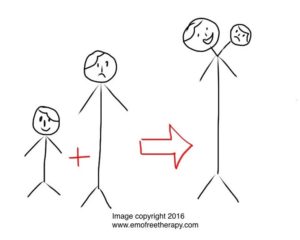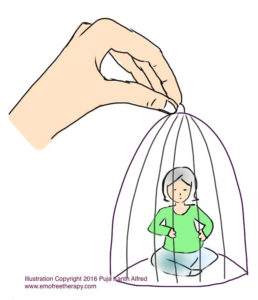
Effect of Negative Language on children
Children that grow up in households where parents use degrading, humiliating and disrespectful language with them and make them feel “not enough”, usually develop low self esteem. Many children grow up in families hearing sentences like –
“You are a bad kid!”
You shouldn’t have been born!”
“You will never succeed in life!”
“You’re good for nothing!”
“You have been a curse to us!”
“You are dumb!”
“Your cousin is much more smarter than you!”
… and much worse!
In fact a client revealed how his alcoholic father went to the extent of saying –“You cannot trust me!”
Many parents rely on criticism and negative language believing that it will make their children responsible. Or they may think that they own their children and have the right to do whatever they want with them. Parents also use frequent comparisons with siblings, sarcasm and threats in their conversations.

Effect of Negative Language
Infants understand facial expressions even before they start communicating. They get affected by hearing shouting and yelling in the house. From the age of 2, they begin to respond to their parent’s communication. If a mother yells at her child, the child may yell back or withdraw into his own world. Slowly as children grow older, the negative statements used by their parents start having a stronger impact on their emotional development. They feel unloved, unwanted, undeserved and unprotected.
Abusive and hurtful words that parents use affect all the areas of children’s lives. It affects their emotional, cognitive and social development. They grow up with feelings of ‘not being perfect’. They feel inadequate and blame themselves for being the cause of parent’s frequent reprimands and negative communication. They feel that they are constantly being watched with a critical lens. There is a feeling of being judged all the time.
These children grow up to be harsh on themselves. It can even make them demanding of others and set very high expectations for themselves as well as for others. They become sensitive about negative comments and there is a tremendous amount of guilt. Kids having verbally abusive parents can even get into substance abuse or commit suicide.
In my interaction with clients with low self esteem, I have found that “hurtful words used by parents” has a profound effect on their self esteem. And when I ask them about how much they think it was their fault in the way their parents spoke to them, they are unable to intellectually find a fault within themselves but emotionally nevertheless, they are unable to shed the guilt and the “burden” of the parental statements. Even as adults, they accept all that was told by their parents. And their whole life is defined by what they ‘heard’ rather than what they ‘are’.
Virginia Satir, a renowned psychotherapist known for her approach in family therapy, says, “Feelings of worth can flourish only in an atmosphere where individual differences are appreciated, mistakes are tolerated, communication is open, and rules are flexible – the kind of atmosphere that is found in a nurturing family”.

Frequent criticism can also make a child eager to always please others. The desire to be seen, heard, understood is a natural desire (Branden, 1983) but only when it takes precedence over vales and honesty and takes control over your life, does it become a problem.
Repeated comparisons with siblings and other children, veiled threats (I will leave you and go away forever, if you do not eat properly), gender related remarks (Don’t cry like a girl) etc. also have a lasting impact on them.
Stanley Coopersmith, in 1967, identified the link between self-esteem and frailty, noting the “indications that in children domination, rejection, and severe punishment result in lowered self-esteem. Under such conditions they have fewer experiences of love and success and tend to become generally more submissive and withdrawn (though occasionally veering to the opposite extreme of aggression and domination)”.
Conclusion:
Nathaniel Branden (1983) says,
“I often tell parents, “Be careful what you say to your children. They may agree with you.” Before calling a child, stupid” or “clumsy” or “bad” or “a disappointment,” it is important for a parent to consider the question, “Is this how I wish my child to experience him- or herself?”
Some parents usually in a fit of anger, stress or frustration say hurtful words. And some parents keep repeating these words under some kind of misconception that they are doing good for the children.
Positive language will help your child in feeling loved and wanted and in realizing his self worth. Here are a few suggestions for responsible parenting:
- Deal with your own ‘past baggage’ or anger with EFT/Psychotherapy.
- Use language that you would like your children to use with you.
- Except when it comes to safety issues, where sometimes a strong ‘No’ is required, try using positive language with your child. Instead of saying “what not to do” suggest “what to do” instead. Rewarding positive behavior would also help.
- Show respect to your children.
- Be responsive and warm with your children.
- Do not compare unnecessarily with other children. Each child is unique and treasure their uniqueness.
- Avoid using ‘ derogatory’ gender related remarks with kids.
- Do not use hurtful conditions in your language. E.g. – I will leave you and go away.
- Do not use sarcasm in your language with children.
- If you are upset with your own personal problems, then tell your child that you need some time and speak to the child in a calm manner despite being upset.
- Do not use emotional blackmail in your language with them. It can be very bewildering for small kids.
- Positive discipline is better than corporal punishment.
References:-
Coopersmith, Stanley. 1967. The Antecedents of Self-Esteem. San Francisco: W. H. Freeman.
Berk, L. E. (1996) Child development. (3rd ed.) U.S.A: Prentice Hall Inc
Branden, N. (1983) Honoring the self: Self esteem and Personal Transformation. New York: J.P Tarcher Inc.


